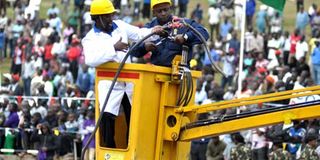Government in talks with employers to determine pay increase for workers

Kenya Power employees display their skills during Labour Day celebrations at Uhuru Park in Nairobi on May 1, 2014. PHOTO | GERALD ANDERSON
What you need to know:
- The hopes of workers who are used to their salaries being adjusted upwards annually during Labour Day celebrations were dashed this year
Workers on Thursday went home empty-handed after the government announced that negotiations were still going on to determine the percentage increment that employers should award them.
The pay rise must be pegged on the country’s economic situation, Labour Cabinet Secretary Kazungu Kambi said during this year’s Labour Day celebrations at Uhuru Park, Nairobi.
The government has been in consultations with Cotu and the Federation of Kenya Employers (FKE) and agreed that there was a need to assess the economy before coming up with a sustainable salary increase.
“We have spoken with employers, your union and asked for more time. But, we shall arrive at the appropriate percentage before the year ends,” Mr Kambi said.
The disclosure dashed the hopes of workers who are used to their salaries being adjusted upwards annually during Labour Day celebrations.
“This is a new government. We stopped crawling the other day. We are now walking. The government is willing and ready to make sure workers are properly paid,” said the Cabinet Secretary.
Cotu’s rival, Public Service Trade Unions of Kenya (Pusetu-K), which had threatened to disrupt the event, was kept away by security officers. (READ: Pusetu: Court should rescind Labour Day order)
President Kenyatta, who did not attend the celebrations, said in a statement that although the Constitution guarantees workers the freedom to strike they should do so within the confines of the law.
“When all other means have failed, it is your right, in the last resort, to withdraw your labour. Like most rights, your freedom too is subject to the law, and to the national values we adopted with our Constitution,” he said.
Workers with grievances should channel them through the Salaries and Remuneration Commission, which is the institution mandated to determine salary and remuneration in the public sector.
“I must remind you, therefore, to make certain that your actions remain within the prevailing law, and that they take reasonable consideration of others’ rights. It is also vital to remind the nation that the demands of our workers ought to be made within the established institutions.”
INDUSTRIAL UNREST
The President said that last year alone, the government received 44 strike notices, which brought industrial unrest affecting more than 300,000 workers.
“More than 11 million man-hours were lost as a consequence. Although all the strikes reported were resolved through conciliation and mediation under the Ministry of Labour and other government agencies, these are still massive losses for a country that faces other major challenges,” he said.
Mr Kambi did not agree with the FKE executive director Jacqueline Mugo who said that the workers’ minimum wages should not be increased.
Ms Mugo also said there was a need for the government to invest in better ways to monitor economic productivity for employees to benefit from salaries commensurate with work done.
Employers want workers’ pay to be set on the basis of their productivity and prevailing market forces as opposed to just pegging the perks on cost of living.
“Demand for a better pay will always be there. But we have to see how to manage minimum wage. We have to ensure that increase in the minimum wages does not take us back,” said Ms Mugo.
Last year, the minimum wage was increased by 14 per cent.
Mr Kambi said the government supported alternative dispute resolution mechanisms to reduce the pile-up of cases at the Industrial Court.
He appealed to trade unions to tone down on strikes, which affected productivity as they resulted in a lot of man-hours being lost.
The minister maintained that the government recognised the right of workers to join trade unions. “The right to join trade unions is provided for under the Bill of Rights in the Constitution.”
The event was also attended by Interior Cabinet Secretary Joseph ole Lenku, National Assembly Majority Leader Aden Duale, Senate Minority Leader Moses Wetangula, MPs and senators.
Mr Wetangula, who spoke on behalf of senators, expressed fears that the government was keen on dividing workers by weakening trade unions.
This should not be accepted, he said. “The government thinks it will weaken the resolve of workers by engaging in deceitful, divisive tactics. This is not the direction to go,” the senator said. (AS IT HAPPENED: Labour Day celebrations)




